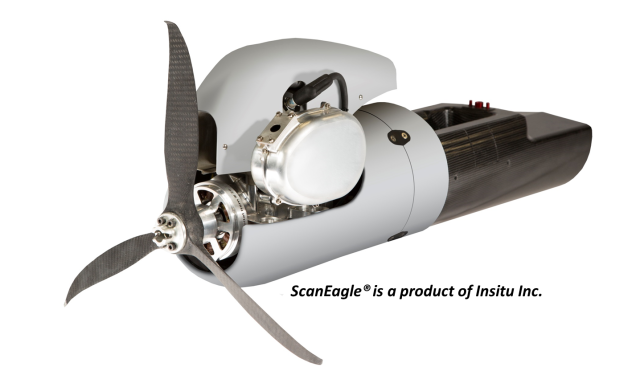
Orbital Corporation Limited has announced the first flight of a ScanEagle Unmanned Aerial Vehicle (“UAV”) with the latest Orbital UAV engine and propulsion system. The flight test, conducted on April 15, was supported by Orbital and carried out by Insitu Inc., a subsidiary of The Boeing Company, at their flight testing facilities in Oregon.
First flight success marks an important milestone in Orbital’s program toward the production development of the new Orbital UAV engine and system. The aircraft and engine performed flawlessly over a range of speeds, flight manoeuvres, and altitudes meeting and exceeding the customer’s performance requirements.
Orbital has been working with Boeing and Insitu since January 2013 as part of an initial design, development and validation contract to supply propulsion systems for the next generation of the ScanEagle UAV program. As recently announced (see ASX announcement dated 4 May 2015) Insitu have chosen Orbital as the preferred supplier of engines and propulsion systems for the new generation ScanEagle UAV and commercial negotiations are continuing for an initial production contract. ScanEagle upgrades include expanded payload options, a fully digital video system for improved image quality, reduced electronic magnetic interference environment, an improved navigation system, and of most significance to Orbital, a newly designed and purpose-built propulsion system.
The original ScanEagle UAV was designed to carry either an electro-optic or an infrared camera in a gyro-stabilized turret. ScanEagle was based on Insitu’s successful SeaScan miniature robotic aircraft developed for the commercial fishing industry. The camera has full pan, tilt and zoom capabilities and allows the operator to track both stationary and moving targets. ScanEagle vehicles can operate individually or in groups, and loiter over a target area for more than 24 hours. The 5-foot-long (1.5-metre-long) ScanEagle UAV has a 10-foot (3-metre) wingspan and can operate in high winds. Its internal avionics bay allows integration of new payloads and sensors and ensures the vehicle will be able to incorporate new technology as it becomes available. ScanEagle is launched autonomously by a catapult launcher and flies pre-programmed or operator-initiated missions. A patented SkyHook system is used for retrieval.
ScanEagle has been successfully deployed in Iraq with the First Marine Expeditionary Force, operating as a forward observer to monitor enemy concentrations, vehicle and personnel movements, buildings and terrain. In April 2005, the U.S. Navy signed a $14.5 million contract with Boeing and Insitu to provide intelligence, surveillance and reconnaissance coverage during Naval Expeditionary Strike Group missions and security for oil 2 platforms in the Persian Gulf. In September of the same year, the Navy awarded a $13 million contract modification to provide ScanEagle system support for Navy high-speed vessels and an afloat forward staging base.
International customers of ScanEagle include the military forces of Australia, Canada, Italy, Japan, the Netherlands, Singapore, Spain and the United Kingdom. Civilian uses have included a weed detection program in Australia, an ice seal census in the Bering Sea, forest fire tracking in Alaska and conducting aerial flood plan research along the North Dakota and Minnesota border. By 2014, ScanEagle had flown more than 800,000 combat flight-hours over land and sea. Insitu’s revolutionary ScanEagle platform is the focus of Orbital’s development of a UAV-focused engine business.
“Insitu is a customer-driven company, and flight testing represents an important milestone in our focus to deliver the innovative and capable technology they expect,” said Mr Ryan Hartman, Insitu’s President and CEO. “The new engine and propulsion system increases ScanEagle’s reliability, capability and affordability, and validates our decision to select Orbital as our engine and propulsion system partner for the program”.
Delivering on the design and validation phase of Insitu’s ScanEagle engine and propulsion system development project is a key element to Orbital’s strategy to develop a UAV engine business. Orbital offers a compelling solution to companies such as Insitu who are seeking, and have an imperative need, to run engines on heavy fuels to improve aircraft range, reduce operating costs, and improve the reliability and durability of their unmanned aircraft. Successful completion of a production contract with Insitu will allow Orbital to establish a full-scale production capability for UAV engines. Initial orders received from Insitu are expected to be manufactured at Orbital’s world-class engineering and workshop facilities in Balcatta, Western Australia pending the establishment of a new higher volume production facility expected to be located in or near Washington in the United States.
Source: Press Release
